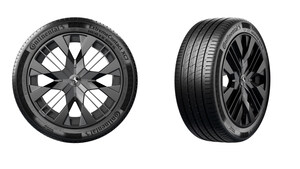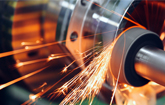Continental to Supply Fuel-Efficient Turbochargers for Ford's New Engine Family
- Developed for the latest 1-liter downsized gasoline engines
- Excellent performance coupled with reduced fuel consumption and lower CO2 emissions
- Completely automated assembly for robust reliability, thanks to sophisticated system design
AUBURN HILLS, Mich., Oct. 14, 2011 /PRNewswire/ -- Continental will be supplying Ford with innovative turbochargers for the carmaker's new engine platform. The three-cylinder direct injection gasoline engines will generate 74 and 88 kilowatts from a displacement of just one liter. The engines are slated for installation initially in the 2012 Ford Focus and later, in the Ford C-Max and in the completely new Ford B-Max. "Thanks to its fully automated assembly, enhanced thermodynamic efficiency and completely new design, our turbocharger provides a tailor-made and inexpensive solution for environmentally friendly driving," explained Gerhard Bohm, head of the Engine Systems business unit in Continental's Powertrain Division. "Continental's cutting-edge turbocharger technology will make it possible for modern combustion engines to remain competitive with alternative engines over the long term with respect to efficiency, environmental friendliness and performance," he said.
For a natural aspirated engine, for example, the combination with turbocharger and direct injection allows for a consumption reduction of about 20%.
Birth of a new generation of turbochargers
The successful collaboration with Ford has resulted in a turbocharger design that meets the particular technical challenges posed by small, downsized engines. The thermodynamics of the turbocharger system have been optimized to achieve the best possible coordination and balance between the compressor and turbine stages. The geometry of the blades has been specifically developed to suit the engine requirements.
"By minimizing rotating masses and thus reducing inertia, and by optimizing thermo-dynamics, we have invested our turbocharger with excellent response characteristics," said Udo Schwerdel, head of Continental's turbocharger product line. The turbocharger's 38-millimeter diameter turbine rotates at up to 240,000 revolutions per minute (4,000 revolutions per second) in the exhaust flow, which can reach 1,050 degrees.
In order to prevent pressure from rising too steeply at high engine output, a waste-gate valve conducts the exhaust gases past the turbine. On the compressor side, a compressor bypass valve prevents air, which has already been compressed, from forcing its way back into the compressor housing when the throttle closes. This safeguard prevents compressor surge, which could damage the turbocharger.
Continental began developing turbochargers for gasoline engines in 2006. Free from the constraints of legacy designs or existing production facilities, Continental was able to start from scratch and develop an improved product. All the main components are designed for fully automated assembly along the same axis, whereas conventional turbochargers have to be put together in several stages, partly by hand. Fully-automated assembly not only ensures top quality but also generates cost benefits – an important consideration in view of the high volume of three-cylinder engines that Ford plans to build. The new Continental turbochargers will be manufactured by Schaeffler, Continental's partner in this venture, at its production plant in Lahr, Germany. The site will have sufficient production capacity for up to two million turbochargers a year.
Continental had good reason to initially concentrate on developing a small turbocharger. Prior to starting the project, market studies revealed future worldwide demand for small, downsized turbocharged gasoline engines in response to the quest to sustainably reduce fuel consumption. But since Continental's turbocharger design is so scalable and flexible, it can easily be adapted to larger gasoline or diesel engines as well. In other words, the new turbocharger represents the birth of a new generation.
With sales of EUR 26 billion in 2010, Continental is among the leading automotive suppliers worldwide. As a supplier of brake systems, systems and components for powertrains and chassis, instrumentation, infotainment solutions, vehicle electronics, tires and technical elastomers, Continental contributes to enhanced driving safety and global climate protection. Continental is also an expert partner in networked automobile communication. Continental currently has close to 160,000 employees in 45 countries.
SOURCE Continental
WANT YOUR COMPANY'S NEWS FEATURED ON PRNEWSWIRE.COM?
Newsrooms &
Influencers
Digital Media
Outlets
Journalists
Opted In





Share this article